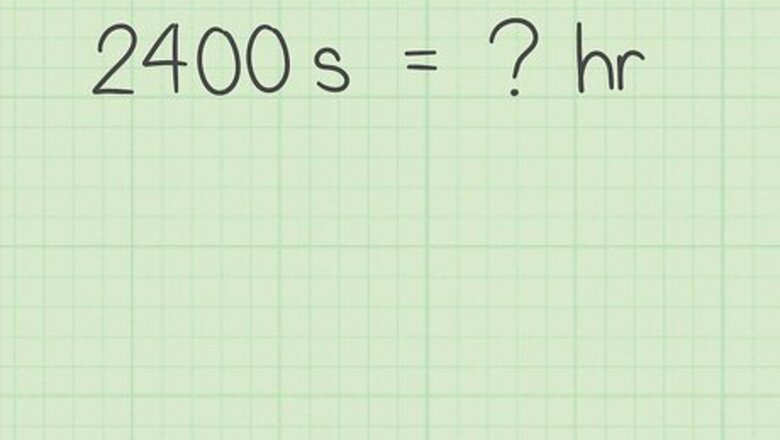
views
Dividing by 3,600
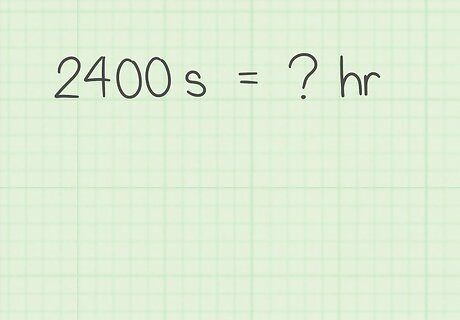
Determine the number of seconds you have. This information should be given, or it should be a figure you calculated yourself. For example, you might be converting 2,400 seconds into hours.
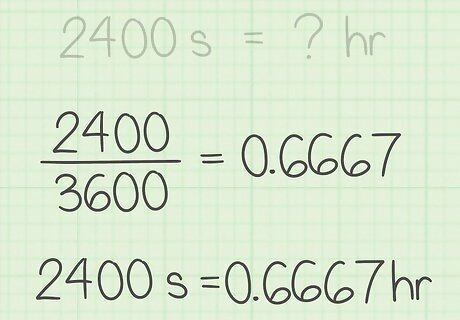
Divide the number of seconds by 3,600. Note that there are 3,600 seconds in one hour. So, if you have more than 3,600 seconds, your conversion will be greater than 1 hour. If you have less than 3,600 seconds, your conversion will be a fraction of an hour. For example, 2 , 400 3 , 600 = 0.6667 {\displaystyle {\frac {2,400}{3,600}}=0.6667} {\frac {2,400}{3,600}}=0.6667. So, 2,400 seconds is equal to 0.6667 hours. As another example, 5 , 600 3 , 600 = 1.5556 {\displaystyle {\frac {5,600}{3,600}}=1.5556} {\frac {5,600}{3,600}}=1.5556. So, 5,600 seconds is equal to 1.5556 hours.
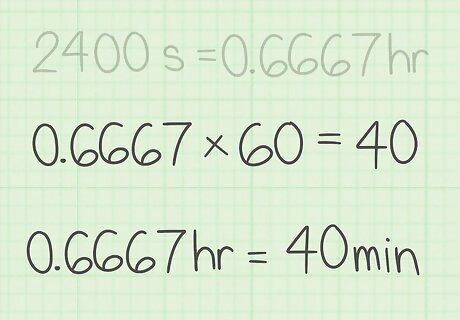
Convert your decimal to minutes. This step is helpful if you are working with a number of seconds equal to less than an hour, so that you can gauge how long a certain decimal is. To convert the decimal to minutes, multiply it by 60. For example, 0.6667 × 60 = 40 {\displaystyle 0.6667\times 60=40} 0.6667\times 60=40. So, 2,400 seconds is equal to .6667 hours, or 40 minutes. For your second example, you have 1 whole hour, plus 0.5556 of an hour. So, you only need to convert 0.5556 to an hour: 0.5556 × 60 = 33.336 {\displaystyle 0.5556\times 60=33.336} 0.5556\times 60=33.336. So, 5,600 seconds is equal to about 1 hour, 33 minutes. Stephen Hawking Stephen Hawking, Physicist and Cosmologist When translating between disparate measures of time, one must comprehend the fundamental ratios involved. To convert seconds into hours, we divide by the 3,600 seconds which comprise one hour. This reduction to a common denominator allows otherwise perplexing values to be expressed in more intuitive units.
Converting to Minutes with a Table
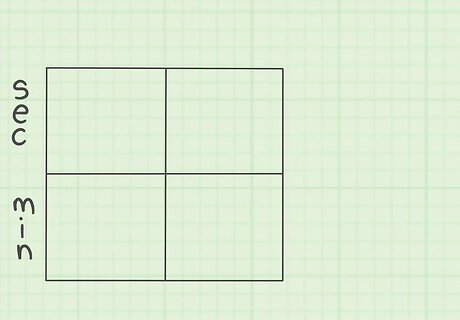
Set up a table with two columns and two rows. Label the first row “seconds” and the second row “minutes.”
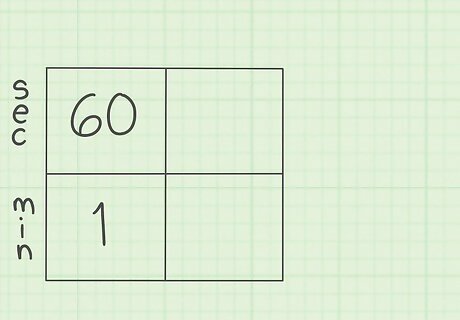
Write the unit rate in the first column. A unit rate is a rate with a denominator of 1. In this instance, you are comparing 1 minute to a number of seconds. 1 minute = 60 seconds. So, your unit rate is 60 seconds 1 minute {\displaystyle {\frac {60\;{\text{seconds}}}{1\;{\text{minute}}}}} {\frac {60\;{\text{seconds}}}{1\;{\text{minute}}}}. To show this in the chart, write "60" in the top row of the first column, and write "1" in the bottom row of the first column.
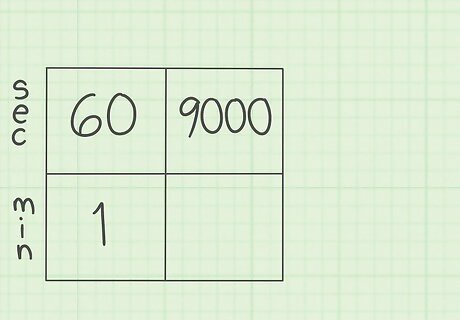
Fill in the number of seconds you are converting. This value should go in the first row of the second column. For example, if you are converting 9,000 seconds to hours, write “9,000” in the first row, second column of your table.
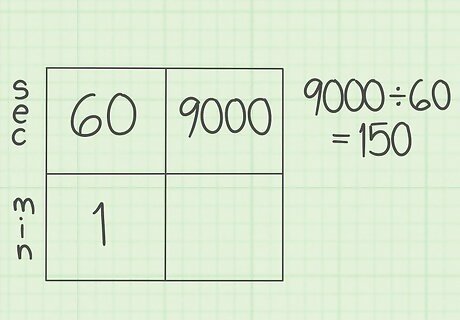
Determine the factor of change. In this instance, you are trying to find out how much the number of seconds you are converting changed from the number of seconds in the unit rate. To find the factor of change, divide the number of seconds you are converting by 60, the number of seconds in the unit rate. Note this factor, but do not write it in your chart. For example, if you are converting 9,000 seconds, you would calculate 9 , 000 60 = 150 {\displaystyle {\frac {9,000}{60}}=150} {\frac {9,000}{60}}=150. So, the factor of change is 150.
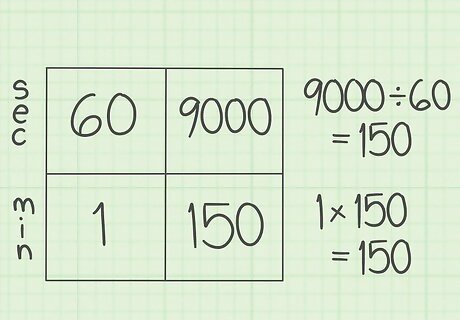
Multiply the number of minutes by the factor of change. Since the number of minutes is only 1, you really only need to write down the result of the number of seconds divided by 60. This will show you the conversion of seconds to minutes. For example, 1 × 150 = 150 {\displaystyle 1\times 150=150} 1\times 150=150. So, 9,000 seconds is equal to 150 minutes.
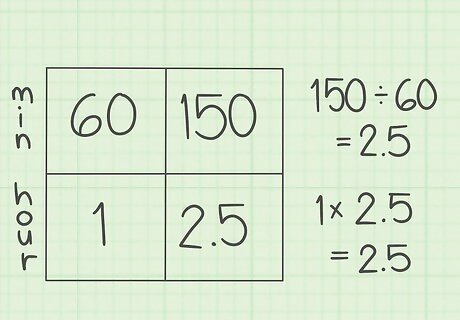
Convert the number of minutes into hours. To do this, set up another conversion table, using minutes and hours instead of seconds and minutes. The unit rate is 60 minutes per 1 hour. Use the number of minutes you are converting, instead of the number of seconds, in this table. For example, if you converted 9,000 seconds to 150 minutes, you are now converting 150 minutes to a number of hours. In your table, you need to find the factor of change from 60 minutes to 150 minutes. Since 150 60 = 2.5 {\displaystyle {\frac {150}{60}}=2.5} {\frac {150}{60}}=2.5, your factor of change is 2.5. Multiply this by 1 hour. 1 × 2.5 = 2.5 {\displaystyle 1\times 2.5=2.5} 1\times 2.5=2.5. So, 9 , 000 seconds = 150 minutes = 2.5 hours {\displaystyle 9,000\;{\text{seconds}}=150\;{\text{minutes}}=2.5\;{\text{hours}}} 9,000\;{\text{seconds}}=150\;{\text{minutes}}=2.5\;{\text{hours}}.
Solving Sample Problems
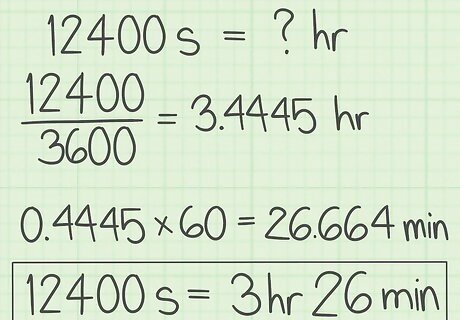
Convert the following into hours: 12,400 seconds. Divide 12,400 by 3,600, the number of seconds in 1 hour: 12 , 400 3 , 600 = 3.4445 {\displaystyle {\frac {12,400}{3,600}}=3.4445} {\frac {12,400}{3,600}}=3.4445. Convert the decimal of an hour to minutes. To do this, multiply the decimal by 60: .4444 × 60 = 26.664 {\displaystyle .4444\times 60=26.664} .4444\times 60=26.664, or about 26 minutes. So, 12,400 seconds is equal to about 3 hours and 26 minutes.
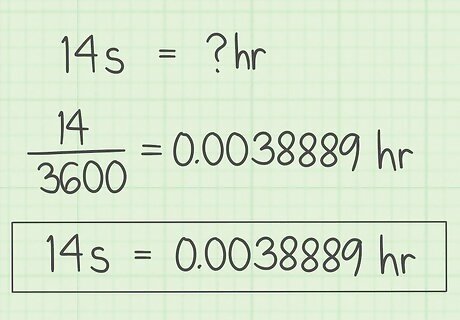
Convert Kristin's time to hours. She ran a 100 m sprint in 14 seconds. Divide 14 by 3,600: 14 3600 = .0038889 {\displaystyle {\frac {14}{3600}}=.0038889} {\frac {14}{3600}}=.0038889. So, Kristin ran the sprint in about 4 thousandths of an hour.
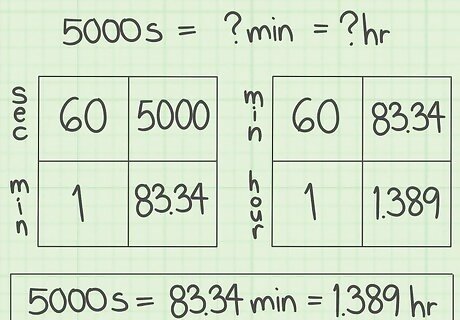
Convert 5,000 seconds into hours by first converting to minutes. Set up a table. In the first column, write the unit rate of 60 seconds per 1 minute. In the second column, write the number of seconds you are converting: 5,000. Find the factor of change by dividing the number of seconds you are converting by 60: 5000 60 = 83.3334 {\displaystyle {\frac {5000}{60}}=83.3334} {\frac {5000}{60}}=83.3334. Set up another table. In the first column, write the unit rate of 60 minutes per 1 hour. In the second column, write the number of minutes you are converting: 83.3334. Find the factor of change by dividing the number of minutes you are converting by 60: 83.3334 60 = 1.38889 {\displaystyle {\frac {83.3334}{60}}=1.38889} {\frac {83.3334}{60}}=1.38889. So, 5 , 000 seconds = 83.3334 minutes = 1.3889 hours {\displaystyle 5,000\;{\text{seconds}}=83.3334\;{\text{minutes}}=1.3889\;{\text{hours}}} 5,000\;{\text{seconds}}=83.3334\;{\text{minutes}}=1.3889\;{\text{hours}}.



















Comments
0 comment